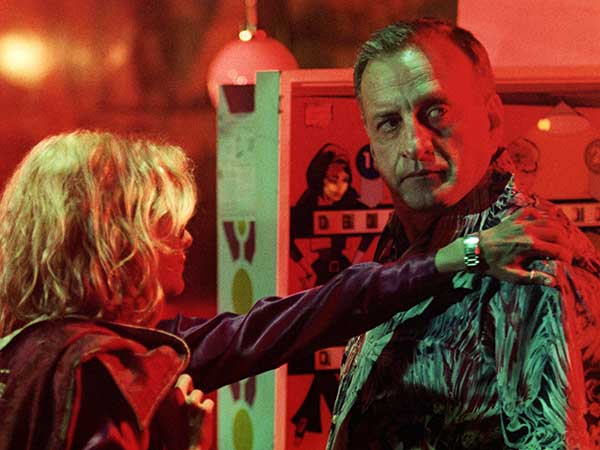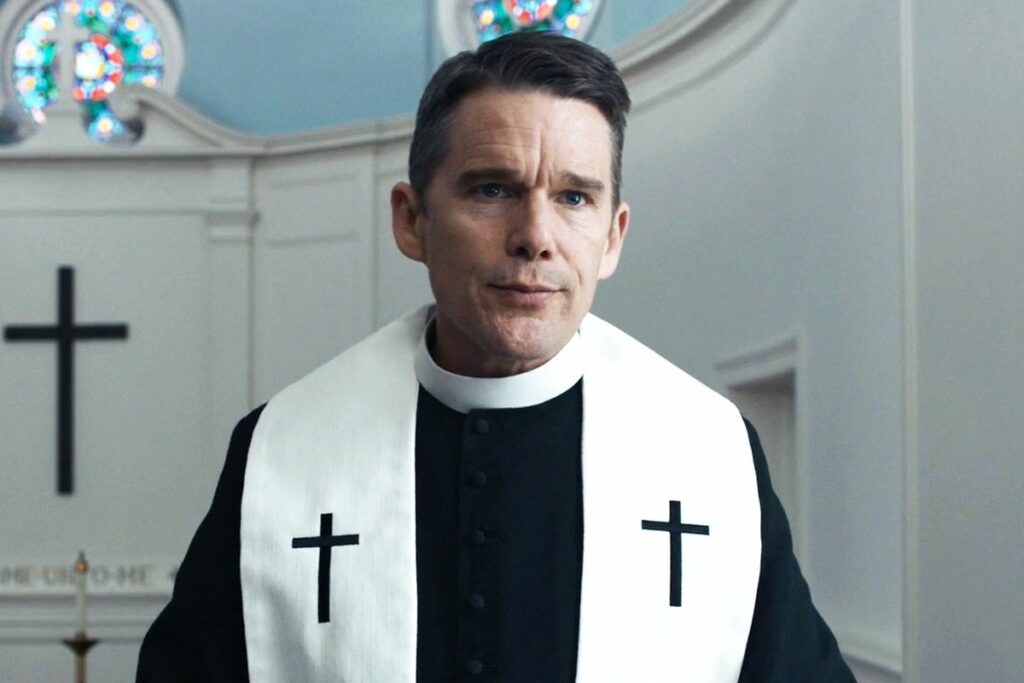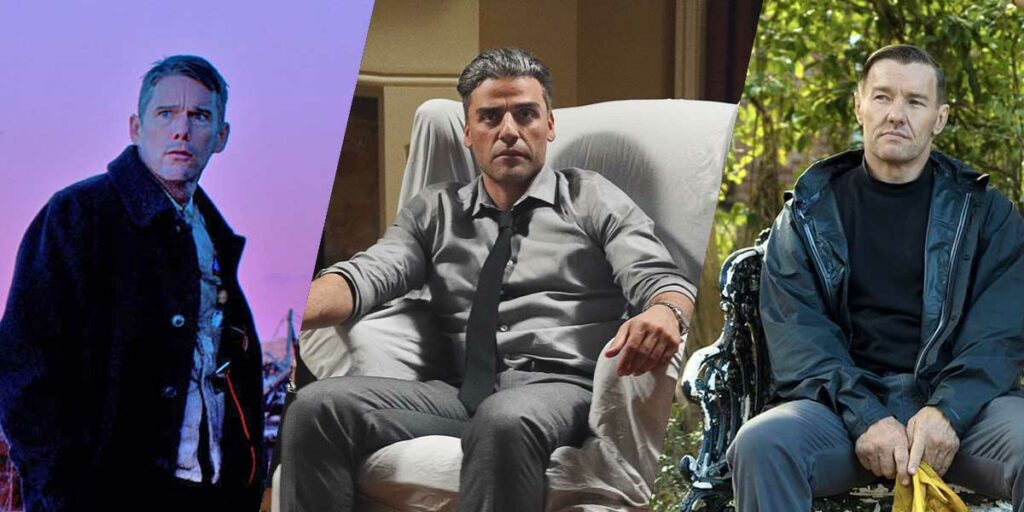Paul Schrader’s films reveal a decades-long trend of a man in a room, wrestling with religion, morality, regret, and what it means to be human.
To watch Paul Schrader’s films is to subject oneself to discomfort. The brazenness of his filmography flies in the face of escapism—he forces us to reckon with ourselves. From the outset of his career as a director, he’s been controversial. He had a run-in with film distributors for publicly inviting Kevin Spacey to work with him, despite allegations against Spacey (which he denied) of sexual assault. His response? “I believe there are crimes in life, but no crimes in art.”
That philosophy may be the perfect summation of Schrader’s unrelenting filmography. He’s made neo-noir, horror, drama, thriller, and supernatural films, and one of the few common themes that runs through them is the influence of religious commentary. In both his early work and the stunning Man in a Room trilogy, Paul Schrader has much to say on the way religion influences morality, and especially what it means to be human.
The Early Years (1978–1997)

Nearly 40 years before the Man in a Room trilogy, Schrader began a career-defining foray into the underbelly of sexuality. Hardcore is Schrader’s most morally straightforward early work; it introduces his trademark commentary on Reformed Christianity, in which a Midwestern Calvinist journeys to the grimiest parts of Los Angeles to find his daughter, who left home to make adult films. The dichotomy is stark. Schrader takes the what-ifs of taboo entertainment and rubs them in the face of a hyper-conservative Christian bent on bringing his daughter back into the fold—a sort of reverse Prodigal Son motif to that found in the Bible. Schrader doesn’t necessarily make either of the characters morally upright, and he’s even slower to show reconciliation between father and daughter. The film ends in a car chase and shoot-out, and the central relationship is left unresolved.
With Affliction (1997), Schrader continues the motif of a man broken by self-deprecation. Wade Whitehouse (Nick Nolte) is a small-town police officer who drinks too much and has little self-control over his anger towards his broken family. Wade’s past resurfaces as he faces his mission: investigating a man’s death in a hunting accident. Schrader’s view of humanity is central; Wade’s internal struggles between the case and his family’s woes reflect a life familiar to Schrader. In a particularly striking scene, Wade’s sister asks Rolfe (Willem Dafoe) about salvation: “How about you, Rolfe, are you saved?” He replies, “No.” He’s quickly met with the threat of going to Hell, and responds, “Well, I guess I will be there, with mom, and Wade, and Pop. We’ll all be there together.” Even in a murder-mystery plot, Schrader forces his viewers to confront religion. In the end, none of the previously condemned changed their minds about salvation.
The Man in a Room Trilogy (2017–2023)
After directing many compelling and odd films, Paul Schrader settled on directing a thematic trilogy—his magnum opus. First Reformed (2017), The Card Counter (2021), and Master Gardener (2023) tell a similar story in different settings, compiling the Man in a Room trilogy. Each film shows a “man in a room,” left alone with regret in the wake of destructive behavior.

Reverend Ernst Toller (Ethan Hawke) has decided to keep a journal of brutal honesty and wrestling with God. In First Reformed (2017), Schrader’s confrontation with religion takes the spotlight. The Reverend of First Reformed Church encounters Michael Mensana (Philip Ettinger), a man concerned about climate change. He voices doubts about God’s existence, especially if the world is going to come to an end over humanity’s abuse of the environment. Micheal’s encounter with Toller is one of his last before he commits suicide, and Toller seeks to console Michael’s grieving wife Mary (Amanda Seyfried). Toller is inextricably affected by his encounter with the Mensanas, and seeks justice over climate change, even while his church falls subject to selling out for profit. He pastes the film’s central question on First Reformed’s church sign: “Will God forgive us?” Throughout the film, Ernst as the embodiment of Christianity doubts the goodness of human nature, and wonders if they’ve strayed from God’s grace. Nevertheless, Mary seems to be the realization of dignity. Thus, humanity’s wrongdoings, materialism, and selfishness are intertwined with the representation of hope in humankind.
Toller’s self-destructiveness and anger swell because of the depravity surrounding (and within) him; he resolves that at the 250th reconsecration service for the church, he will make a statement about climate change. The only thing stopping him from using the bomb vest under his robes is Mary. As she strides up to the church, Toller realizes he can’t hurt the woman he loves.
This film is an observation of hope, despair, and self-sabotage; especially poignant is its assessment of prayer. The Reverend finds hope not in the church, but in a savior-figure (probably intentionally) named Mary. This is a stark religious claim: sometimes people find hope outside the church, even as they reside within it—a perfect allegory for Schrader’s personal experience with religion. In First Reformed, Schrader depicts a doubtful, scared, and angry priest and a peaceful, hopeful, loving parishioner. He flips the idea that Christian leaders are morally superior and more faithful on its head, making Mary the one people would sooner emulate. The viewers, however, feel sympathy for both Ernst and Mary, as they are honest depictions of the human experience. Perhaps we travel between the two extremes: we are often filled with doubt or anger, but we may also find hope in companionship and peace about the future.
The Card Counter (2021) is less religiously influenced, though similar themes remain. William Tell (Oscar Isaac), an ex-military man, wrestles with his time spent torturing prisoners in the Iraq War. To distract himself (or to give his life purpose), he became a master at playing cards. His routines are mechanical: he covers his hotel room furniture with white sheets and journals on the art of gambling. The Card Counter is cryptic at first, showing Tell in casinos and merely hinting at his dark past. As it progresses, Tell meets La Linda (Tiffany Haddish) and Cirk (Tye Sheridan), who each pull him in opposite directions. The former offers him a chance to take his casino skills to the next level; the latter, the son of Tell’s late comrade, beckons him on a journey of revenge against retired Major John Gordo (Willem Dafoe), the man responsible for Cirk’s father’s death. Tell seeks to harmonize both options, using La Linda’s offer to earn money to support Cirk and, he hopes, teach him that revenge doesn’t remove the pain or guilt that comes with violence.
The noir thriller endeavors answering a looming question: can everyone be forgiven? Or, is there an unforgivable sin? For Tell, the answer is complicated. He admits that his guilt over his past will never subside, and by the final act of the film he becomes the one bringing judgment down on Maj. Gordo. The men of the film are brutal examples of ways in which people hurt each other. Soldiers, cardsharps, and college students aren’t totally beyond violence. In contrast, La Linda is the female “savior” similar to Mary in First Reformed. Though Tell’s romantic connection to her ultimately doesn’t stop him from harming Gordo, she is the only means by which he may have a better life beyond journaling about his sins. She gives him a glimpse of the lucrative life he could live, unburdened by his past. Again, Schrader paints humanity as capable of (even desiring, in Cirk’s case) violence and revenge, but reminds the viewer that virtue remains in everyone. The horrors of Tell’s past don’t define his potential to have a meaningful future.
Master Gardener (2023), the final installment of the Man in a Room trilogy, opens in familiar territory: Narvel (Joel Edgerton) journals about the history and technique of gardening. In his solitude he lingers on his Confederate Flag and Nazi tattoos: remnants of his past as a Proud Boy. He works for Norma Haverhill (Sigourney Weaver) at Gracewood Gardens, and she asks him to train her biracial grandniece Maya as an apprentice. Throughout the film, the relationship between Narvel and Maya feels like water coming to a quick boil. They become romantically involved, but that heightens the risk of Maya learning about Narvel’s racist past. As their relationship grows, Norma despises them more for it, and essentially fires Narvel. Soon, Maya sees his tattoos and reacts with confusion and disgust.
The girls in Narvel’s life are not the saviors he thought they would be. They want nothing to do with him. He still tries to protect Maya from drug dealers trying to harm her. As they work through their new relationship dynamic, they learn that Gracewood was vandalized by the dealers, and resolve to return and help rebuild it. Narvel approaches his former employer with a set of odd demands: he will rebuild the garden and return to his job, if Norma allows them to get married and live together on the property.
One of the main reasons people believe in religion is to find purpose. Wrapped up in religion (and even in the Calvinism Schrader forsook) is the idea of forgiveness for wrongdoings, hope for the future, and meaning in life. Narvel lives with his former beliefs inked into his skin forever—reminders of his vile acts and a barrier between his belief that he can truly be forgiven. Master Gardener finds similarities with First Reformed (a man taking notes of reflection) and The Card Counter (a man burdened by the things he did with a gun), but even more clearly contrasts it with beauty. Narvel is surrounded by plant life, color, and, as he would say, “a belief in the future. That things will happen according to plan; that change will come in its due time.” The film forces Narvel’s past life into the present, and places into question how he will change the future. It’s as stark as ever, and Schrader seems to intentionally write religion out of the solution for Narvel’s problems. In the end, Narvel finds that even the most inhumane acts can be left behind for the belief in the future. A complete life change is possible and as beautiful as the flowers he tends with Maya.
In all, Paul Schrader’s work is exceedingly straightforward, often uncomfortable, and always substantive. Watch with caution, for he will force you to reckon with the most important questions in life; questions about meaning, purpose, forgiveness, and the way we live as human beings in an aching world.

